Inflight Magazine of Brussels Airlines
Welcome to the Inflight Magazine of Brussels Airlines
Business trends
Text Boyd Farrow
Our round-up of what’s happening in the business world across Europe
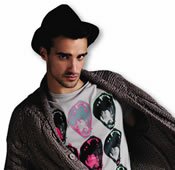 Barcelona-headquartered high-street fashion chain Mango has just announced an even riskier venture than allowing Penélope Cruz to design a 25-piece collection. Mango is setting up shop in the city of Arbil, in the northern Kurdish region of Iraq.
Barcelona-headquartered high-street fashion chain Mango has just announced an even riskier venture than allowing Penélope Cruz to design a 25-piece collection. Mango is setting up shop in the city of Arbil, in the northern Kurdish region of Iraq.
Lebanese designer Zuhair Murad, who has collaborated with the retailer since 2006 on Middle East-specific collections, believes this is the perfect outpost to sell his signature ruffled tunics and flowing shapes. Around 30% of Mango products sold in the Middle East are designed specifically for the region and Murad’s collections are only available in Arab countries. Mango has 1,144 stores in 90 countries, but the Middle East is an increasingly important market, accounting for 13% of group revenues, or €1.33bn, in 2007. The group has 84 stores in the region, including shops in Saudi Arabia, Dubai and Israel. It plans to open another 22 Middle Eastern stores this year alone.
Another profitable region is Russia, where Mango has opened 13 stores this year. It currently operates 48 shops and plans to open 10 to 20 outlets per year. Russia represents 4-5% of total sales volumes.
Mango recently successfully launched a menswear collection, called ‘Mango He’. The first Mango He shop opened in Ankara in Turkey and the collection will be gradually rolled out to larger stores worldwide.
DRAWING BOARD
Europe back on track
 Strasbourg’s economy is booming, with once run-down businesses thriving and new boutiques like Hermès, Cartier and Gucci opening. The reason for this turnaround? France’s new love affair with the tram.
Strasbourg’s economy is booming, with once run-down businesses thriving and new boutiques like Hermès, Cartier and Gucci opening. The reason for this turnaround? France’s new love affair with the tram.
A network of high-tech streetcar lines, not to mention very cool-looking tram carriages, is being created throughout France as city planners combat traffic jams and gridlock. Nantes, Grenoble, Bordeaux, Clermont-Ferrand, Marseille and even southern Paris have already brought back the tram, and Lille and Lyon are set to follow. Indeed, the French network of tracks is set to grow to 576km by 2015. Moreover, soon there’ll be a connection between the tram and the regional train network, with Strasbourg’s tramline running 25km to the EuroAirport, which is shared with Basel, Switzerland, and Freiburg im Breisgau, Germany.
Indeed, tram building is ongoing throughout Europe. Networks in Antwerp, Ghent and Brussels are gradually being extended and trams are now the main form of public transport in Helsinki. Athens reinstated a modern tramline for the 2004 Olympics, with vehicles designed by Ferrari designer Sergio Pininfarina. In Spain, modern tram networks have opened in Barcelona Valencia, Bilbao, Alicante and Madrid. And Florence is building three new tramlines.
It’s not just Europe, either. German giant Siemens has set up a manufacturing plant in Sacramento, California, and almost 30 US cities have introduced new streetcars, and 50 more have either begun construction or announced plans for light rail transportation.
Buzzing about…
Dutch duo fuels powerful diesel
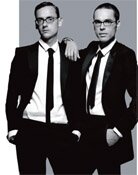
Viktor Horsting and
Rolf Snoeren are now
part of the OTB stable Renzo Rosso, the owner of Diesel, has taken a controlling stake in Viktor & Rolf, the label of Dutch conceptual fashion artists Viktor Horsting and Rolf Snoeren. Only the Brave (OTB), Rosso’s Italian holding company, raked in revenues of
€1.3bn last year. The entrepreneur, who is assembling a collection of designer labels of the future, already controls Dsquared and Maison Martin Margiela, and OTB manufactures Vivienne Westwood’s range. Viktor & Rolf already has a fragrance deal with L’Oréal, but the licensing arrangement with Italian manufacturer Gibo will end as Staff International, OTB’s production arm, takes over. There are plans to open at least five Viktor & Rolf stores in the next five years, with Rosso confirming that he wants to create “product categories”.
NOT REALLY… OVER
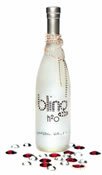 There are very few good things about an economic recession, but one cheering consequence of our fiscal meltdown is that there will be fewer consumer goods around studded with Swarovski crystals. The bling blight that the Swarovski company – headquartered close to discreet Zurich, of all places – has been inflicting on the world must be nearly over, right?
There are very few good things about an economic recession, but one cheering consequence of our fiscal meltdown is that there will be fewer consumer goods around studded with Swarovski crystals. The bling blight that the Swarovski company – headquartered close to discreet Zurich, of all places – has been inflicting on the world must be nearly over, right?
Well, not exactly. In the past month alone, Harrods (a taste-free zone at the best of times) has announced a range of €6,000 Swarovski-studded chocolates. And, for the conspicuous consumer, there is now a €25 bottle of water Bling H2O, which comes in containers decorated with, yup, your favourite crystals.
Finally, flamboyant Milan-based designer Roberto Cavalli, has just announced that the nightclub he is opening in November – in Dubai – will feature 6m high walls “dripping” with Swarovski crystals. Just imagine: Swarovski, Cavalli and Dubai, all together in one ball of fabulousness that will also boast “atolls in gold-coloured glass and fur, suspended from the floor hosting a sushi bar and wine bar” and “Cavalli-signed chocolates”. Suddenly Europe, dripping only with doom and gloom, seems so much more attractive.
RADAR
CEMENTING RELATIONS
 German firms are snapping up lucrative reconstruction contracts in Iraq, which this year will spend a quarter of its €100bn haul from oil exports on a power grid, new highways, modernised oil-drilling facilities, bridges, machines and trucks. Significantly, new laws have been passed allowing foreigners to import machines and production facilities duty free, and all Iraqi taxes on their profits are waived for 10 years.
German firms are snapping up lucrative reconstruction contracts in Iraq, which this year will spend a quarter of its €100bn haul from oil exports on a power grid, new highways, modernised oil-drilling facilities, bridges, machines and trucks. Significantly, new laws have been passed allowing foreigners to import machines and production facilities duty free, and all Iraqi taxes on their profits are waived for 10 years.
Germany has not only managed not to burn its political bridges in Iraq, it has a reputation for building real ones as well. Indeed, German mechanical engineers, facility builders and pipeline construction companies look set to land many lucrative contracts. Iraqi prime minister Nouri al-Maliki recently visited Berlin to enlist German firms, and German economics minister Michael Glos has also paid a visit to Baghdad. Maliki called on German-Iraqi surgeon and Hanover resident Hassan al-Haddad to find a German company to build 10 hospitals, and AHG Industry, a German building materials firm, has won a contract to build a cement plant near Kirkuk.
Upgrade your trip
WITH A TWO-WHEELED MERCEDES
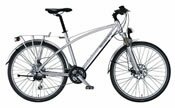
Explore Munich by
bicycle, courtesy of
Mandarin Oriental The chi-chi Mandarin Oriental Munich has completed its €7m, year-long renovation, which included the refurbishment of its façade and guest rooms and the installation of a roof-top infinity pool with views of the city. The 73-room hotel now offers wireless internet access throughout (at a charge) and Bang and Olufsen televisions in the bedrooms (mandarinoriental.com),
More unusually, the hotel provides guests with free use of Mercedes-Benz bicycles, along with three suggested routes to experience different aspects of the city. It has also started offering bespoke tours with a Munich art expert, giving access to private collections and artists’ studios. Tours range from two hours to a full day and start at around €400.
Mandarin Oriental has three other hotels in Europe, in Geneva, Prague and London, but plans to double its presence by 2011. Next July, a property will open in Barcelona, with others set for Moscow, Paris and Milan.
Why are we here… in Moscow traffic

As Russians buy
more cars, Moscow
traffic just gets worse PricewaterhouseCoopers has just confirmed what anyone who ever sat in a Moscow traffic jam already knew: Russia has officially overtaken Germany to become Europe’s largest car market. Around 1.645 million new cars were registered in Russia during the first half of 2008, compared with 1.63 million in Germany. Although this rapid growth is nothing new, analysts have been stunned by its continued strength, beating all forecasts. Growth has actually accelerated since 2007, when car sales were up 35%. PwC predicts that, for 2008, the total Russian market will reach between 3.6 million and 3.8 million cars. Five years ago it was 1.5 million. Over the same five-year period, the share of foreign models has risen from 38% to 59% of new car sales. Car sales in Western Europe, meanwhile, are growing at less than 5% annually. Naturally, carmakers are rushing to set up or expand production in Russia. Ford, Renault, General Motors and Volkswagen already have plants there. Others, including Nissan, Peugeot and Mitsubishi, are building factories. A second General Motors factory, in Saint Petersburg, is due to open next year. Meanwhile, Renault paid €600m in February for a 25% stake in AvtoVAZ, Russia’s largest car manufacturer.
Incredibly, Russia’s market looks like it still has plenty more legroom. PwC predicts sales will keep rising, reaching six million units by 2014, more than double what they were last year. In fact, by 2012, Russia’s car market will be the third largest in the world, behind only the US and China. Better give yourself an extra hour to get to Domodedovo airport.
Traffic report
Upwardly mobile
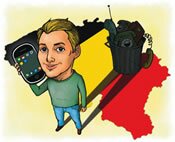
Illustration Mat Bartlett While most of Europe’s telecoms companies are having a tough time, Mobistar, Belgium’s second-biggest mobile operator, reported first-half yearly figures above market expectations and raised its forecasts for the full year, sending its shares surging. The company, majority-owned by France Telecom, said pre-tax earnings fell only 0.7% to €300m, ahead of expectations.
Group revenue dropped by 0.2% to €745.5m, better than expected as the purchase of Luxembourg’s VOXmobile partially offset lower mobile termination rates (the fees operators pay for handling each other’s calls). Belgian regulators have already forced a cut in termination rates, while the European Commission is now considering plans to reduce the charges by 70% by 2011 and to slash the price of sending text messages across Europe.
Mobistar says its success is due to successful campaigns to persuade residential clients to ditch their fixed lines for mobiles and special offers for businesses. There may be another reason: Mobistar is the sole seller of Apple iPhones in Belgium and, unlike elsewhere in Europe, it sells the handsets unlocked so they can be used with any network.
Leave a Reply
